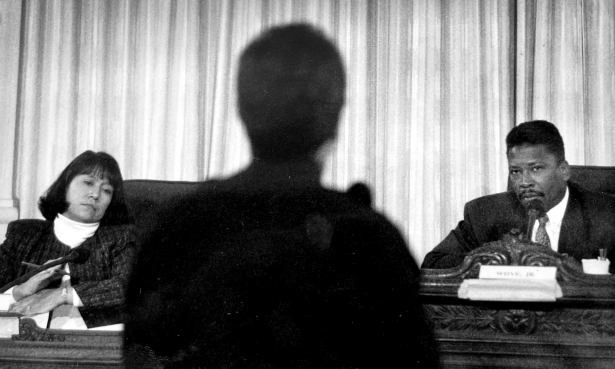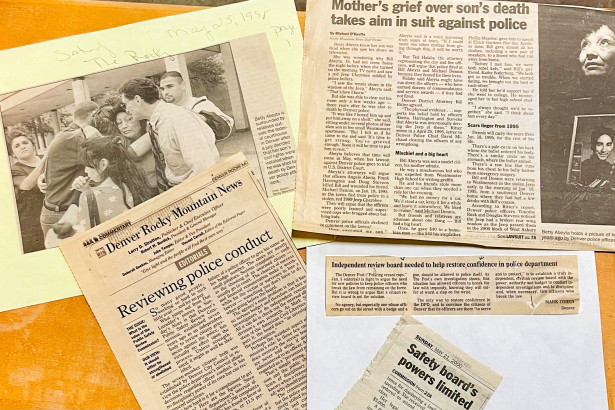Written by Julia Torres (Guest Blogger)
What treasures lie within the special collections of the Blair-Caldwell African American Research Library?
Finding the answer to this question was the task I was honored to undertake this past spring. As part of my culminating internship for the University of Denver’s Master of Library and Information Science (MLIS) degree, I helped to accession the Denver Public Safety Review Commission Records (ARL289), a collection housed temporarily at the Central Library while the Blair-Caldwell African American Research Library was undergoing renovations during 2022 and 2023.
During my experience with the records from Denver's Public Safety Review Commission (PSRC), I learned that “no-knock” or Immediate Entry policies for police forces are always in need of close review. I also learned of the existence of City Monitor positions in many cities across America and the reasons why they exist. I learned that civilian oversight of the Denver Police Department has been ongoing since Denver’s earliest days, and that it is as necessary today as it ever has been.
Part of what I wanted to do was arrange the records in the collection so that they would not only make sense to those discovering the stories within them, but also shed light on what modern-day relevance these records have.
The hardest part of this process was stopping myself from getting lost in the information contained within the collection’s folders. News clippings in some folders told stories of Central American immigrants being shot by the police during a routine traffic stop and of litigation against police officers who, while performing crowd control, had screamed racial slurs at children during Thomas Jefferson High School’s prom. It is particularly interesting that the majority of the most riveting events in the collection happened in 1996, the year after the O.J. Simpson trial. The Denver Public Safety Review Commission itself was formed in 1992, in the wake of the Rodney King beating.
As for modern-day relevance, there is a section of the collection that deals with recommendations to the Denver Police Department regarding Immediate Entry policies and procedures. Breonna Taylor was murdered on March 13, 2020, as a consequence of a botched police raid and Immediate Entry policies. Her murder is one of many that have precipitated a wave of legislation changes to Immediate Entry policies. In 2023, the Colorado State Legislature passed a bill that made significant changes to the existing policies. Given the fact that since 2015, at least 22 people have been killed during the execution of “no-knock” warrants, it seems this bill has the potential to have tremendous impact. The papers of the PSRC reveal work the Commission did to shed light on harmful practices 30 years before the current legislation passed.
Along with this revelation, came the connection between NACOLE (National Association for Civilian Oversight of Law Enforcement) and the PSRC. It seems that PSRC was the Denver affiliate or manifestation of this organization, as there is a folder in the collection documenting that members of the PSRC went to the NACOLE conference several times. Once I discovered that key piece of information, everything I was seeing began to make sense. However, I began to feel a tremendous sense of responsibility to the victims of violent crime whose stories were documented in the collection. In reading their stories, I got a bit lost and wanted to make sure I did the collection justice by preserving their stories in a way that would make them discoverable, rather than keep them hidden.
It is my belief that this collection could play an important role in rewriting the story of Denver and the history of Black Indigenous and other People of Color in Denver. Some of the highlights are:
- Newspaper clippings, which highlight times when the PSRC was featured in the press. They detail when the Commission was established and why; key stories, including the story of a teenager who was murdered by the police during a “no-knock” raid; and why the Commission began to transform toward the early 2000s
- The Report of the Erickson Commission: A report on police involved shootings which set the tone for other subsequent work and ultimately laid the foundation for the city monitor position which exists today
- Litigation involving the ACLU, City and County of Denver, the Denver Chief of Police, and Colorado Supreme Court, in which officers refused to testify or make their testimonies available for the purposes of investigation due to their self-incriminating nature
- Information about a crowd control incident at Thomas Jefferson High School in which several parents wrote letters to the PSRC requesting investigation of police officers
- Timelines detailing civilian oversight of police actions dating from the 1800s
- Correspondence between PSRC Chair Chet Whye, Jr., the Denver Manager of Safety, and the Denver Chief of Police
It has been such an incredible experience to dig into a box of material dating from 30 years ago and make it accessible to the public. Whomever donated the collection to BCAARL was very thoughtful and deliberate when they gave these records to the library. I believe they were hoping that someday the injustices discovered by the PSRC would be of import to someone. Though the PSRC was not successful in getting a writ of certiorari from the Supreme Court when they wanted to compel officers to give testimony, the documentation of the larger story is an important action they took. Just the fact that they collected and documented citizen complaints against the police force stands as evidence of the fact that injustices did and still do occur.
Through this experience in the archives, I’ve learned that those in power decide what records and artifacts will be valued, preserved, and arranged for discoverability. For most of the history of Denver those in power were concerned with documenting their own existence. As such, it is clear that the decolonizing work of archival librarianship is of tremendous import. It is one that I hope to undertake in the future.



Add new comment